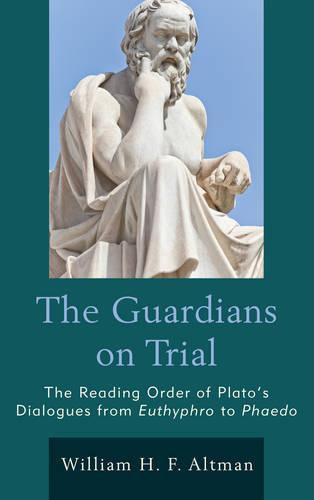Readings Newsletter
Become a Readings Member to make your shopping experience even easier.
Sign in or sign up for free!
You’re not far away from qualifying for FREE standard shipping within Australia
You’ve qualified for FREE standard shipping within Australia
The cart is loading…






Based on a conception of Reading Order introduced and developed in his Plato the Teacher: The Crisis of the Republic (Lexington; 2012) and The Guardians in Action: Plato the Teacher and the Post-Republic Dialogues from Timaeus to Theaetetus (Lexington; 2016), William H. F. Altman now completes his study of Plato’s so-called late dialogues by showing that they include those that depict the trial and death of Socrates. According to Altman, it is not Order of Composition but Reading Order that makes Euthyphro, Apology of Socrates, Crito, and Phaedo late dialogues, and he shows why Plato’s decision to interpolate the notoriously late Sophist and Statesman between Euthyphro and Apology deserves more respect from interpreters. Altman explains this interpolation-and another, that places Laws between Crito and Phaedo-as part of an ongoing test Plato has created for his readers that puts the Guardians on Trial. If we don’t recognize that Socrates himself is the missing Philosopher that the Eleatic Stranger never actually describes-and also the antithesis of the Athenian Stranger, who leaves Athens in order to create laws for Crete-we pronounce ourselves too sophisticated to be Plato’s Guardians, and unworthy of the Socratic inheritance.
$9.00 standard shipping within Australia
FREE standard shipping within Australia for orders over $100.00
Express & International shipping calculated at checkout
Based on a conception of Reading Order introduced and developed in his Plato the Teacher: The Crisis of the Republic (Lexington; 2012) and The Guardians in Action: Plato the Teacher and the Post-Republic Dialogues from Timaeus to Theaetetus (Lexington; 2016), William H. F. Altman now completes his study of Plato’s so-called late dialogues by showing that they include those that depict the trial and death of Socrates. According to Altman, it is not Order of Composition but Reading Order that makes Euthyphro, Apology of Socrates, Crito, and Phaedo late dialogues, and he shows why Plato’s decision to interpolate the notoriously late Sophist and Statesman between Euthyphro and Apology deserves more respect from interpreters. Altman explains this interpolation-and another, that places Laws between Crito and Phaedo-as part of an ongoing test Plato has created for his readers that puts the Guardians on Trial. If we don’t recognize that Socrates himself is the missing Philosopher that the Eleatic Stranger never actually describes-and also the antithesis of the Athenian Stranger, who leaves Athens in order to create laws for Crete-we pronounce ourselves too sophisticated to be Plato’s Guardians, and unworthy of the Socratic inheritance.